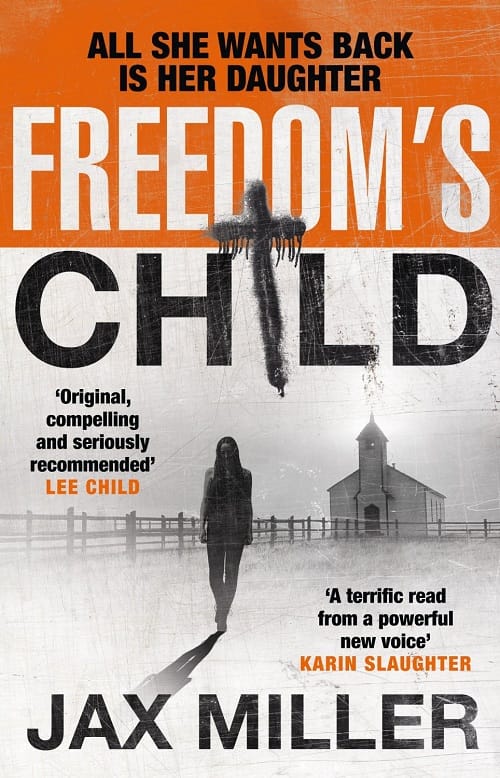What’s the best way to tell area residents about plans for a new asylum shelter nearby?
The government should tell communities directly about plans for new asylum shelters, some activists and politicians say.
One weekend after author Jax Miller finished writing it, Harper Collins reportedly paid a six-figure sum for Freedom’s Child. Did the publisher get its money’s worth?

Given the recent successes of Gone Girl and The Girl on the Train, publishers have been looking for the next big thing, and, one weekend after it was finished, Harper Collins paid a six-figure sum for Freedom’s Child, promptly bestowing Ireland-based author Aine O Domhnaill with the more customer-friendly nom de plume of Jax Miller.
No one appears to have told Harper Collins that the first name is Dublin slang for a toilet, or perhaps they don’t care. American by birth, Miller’s sights are firmly set on the US, where this thriller happily festers amidst the downtrodden Americana of crazy cults, dive bars, and lousy diners.
As with Gillian Flynn’s and Paula Hawkins’s books, the heroine is an apparently relatable woman, no longer young but still ready to give feisty a kick up the ass, who chases danger almost as a relief from the humdrum existence in which she finds herself suffocating.
As publishers well know, in real life, these ladies are more likely to pick up a book than a semi-automatic pistol, but that’s exactly what thrillers are for: taking us on improbable but just-believable journeys through the dark, sleazy and dangerous world of crime.
Unlike Gone Girl, which was much more humorous than the film wanted you to think, or The Girl on the Train, which is a kitchen-sink drama gone horribly wrong, Freedom’s Child is unrelentingly bleak. The prologue tells us: “My name is Freedom Oliver and I killed my daughter . . . Somewhere in this field my daughter is scattered in pieces.”

All hopes of a happy ending thus dashed, we are force-fed the horrid minutiae of Freedom’s life in the Witness Protection Program, slowly gathering clues as to what led her to where she is now: a barmaid surrounded by rapacious bikers, her only friends a gruff but tender lesbian, a hooker with a heart of gold, a kindly single-dad cop, and an elderly neighbour suffering from dementia, which helps us see Freedom’s kindly side, as she cares for the people that others have forgotten.
This is just as well, because the foul-mouthed drinker with a tragic past schtick threatens to wear a bit thin, until the action kicks off.
You do begin to wonder if Freedom has ever had a lucky break in her life: “I was giving my mother a pedicure on her deathbed. It was the August after I’d graduated high school, top of the class, I might add. It was the day a pregnancy test came back positive in the restroom of a Roy Rogers. It was the day my mother died.”
But no – Freedom has absolutely no luck whatsoever. If anything can possibly go wrong, it will.
Rape? Sure. Murder? It just sort of happens. A deadly triumvirate of psychopathic brothers out for revenge for the killing of her husband? Yup, that’s a day in the life of Freedom, a quivering mouse to God’s vengeful cat.
This being a novel steeped in the everyday cruelties of the Bible Belt, God pops up quite a lot, usually as an excuse for people to do terrible things to each other, and, just occasionally, to offer a glimmer of hope. This will suit American audiences more than others, perhaps, but as we know, where we are geographically and psychologically, God gets a free pass.
As you’d expect, the good guys are the outsiders: Freedom’s raggedy assortment of friends; the despised disabled brother of her otherwise truly evil in-laws; a helpful Native American shaman (yes, really). The bad guys are a gallery of grotesques: a wealthy religious cult with a seemingly perfect facade; corrupt redneck cops; the despotic mother-in-law who survives on ill-gotten benefits but manipulates everyone around her to her will.
Predictable, yes, but it does give the book some heart, which is important when the plot is as determinedly grim as this one. By the end, you’re rooting for Freedom, much as you’d naturally root for someone consistently losing at roulette. “Come on, God!” you cheer, some of Freedom’s knee-jerk cynicism rubbing off on you. “Just one lucky break, you heartless bastard!”
Taken as a whole, it’s crude but effective. The characters are vividly drawn in broad, colourful strokes, the multiple plot lines are deftly juggled, and the ending packs an emotional punch. There’s enough action to make an easy transition to the big screen.
It reads as if Miller knew exactly what she doing, and Harper Collins got their money’s worth.
Freedom’s Child by Jax Miller (Harper Collins, July 2015)